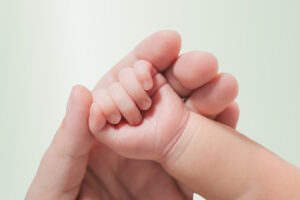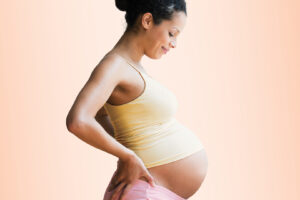Newborns are tiny, so why does caring for them feel like a nonstop full-body workout? “New parents often experience neck, back, hip and wrist pain, even from simple tasks, because they’re continually lifting, carrying and holding their baby in awkward positions,” explains CentraState physical therapist Elvira Ngo, PT. “It’s not just heavy lifting that causes issues; repetitive motions, poor posture and bad body mechanics are enough to trigger pain.”
Ngo, CentraState physical therapist Maria Comp, PT, and CentraState pelvic floor physical therapist Sarit Kisin, DPT, PRPC, recommend these tips to help parents and caregivers prevent injury when providing infant care.
- Lifting your baby from the crib: Bring your body close to the crib and use your legs to squat as you lift your baby, rather than bending only from the back and waist. If the crib is adjustable, place the mattress at a height that lets you comfortably reach your baby while still keeping them safely secure.
- Picking your baby up from the floor: Lift with your legs. Use a squat or subtle lunge to lift your baby while keeping them close to your chest for better balance. Engage your core by gently drawing your belly button toward your spine and exhale as you lift.
- Feeding your baby: Ensure you have support for your back during breastfeeding or bottle feeding. Use a feeding pillow to prop up your baby and avoid bending over and looking down too much, which can strain your back and neck. Switch sides regularly to prevent overusing one side of your body.
- Carrying your baby on your hip: Alternate sides when carrying your baby to prevent overuse injuries. For longer carrying times, consider a soft baby carrier that holds your little one close and evenly distributes weight.
- Carrying a car seat: Avoid holding the car seat with one arm extended, which stresses your shoulder, back and wrist. Carry it close to your body or, when possible, lift your baby out first and then go back for the seat.
“New parents are focused on their baby’s health, but they need to take care of their own bodies, too,” says Kisin. “When your baby is resting, squeeze in some stretching, movement and resistance exercises to build core and muscle strength and help you care for your baby without any aches and pains.”
If you’re experiencing ongoing pain, talk with your physician or a physical therapist before minor aches become long-term problems.
Physical Therapy at CentraState
Learn more about physical therapy at CentraState.





